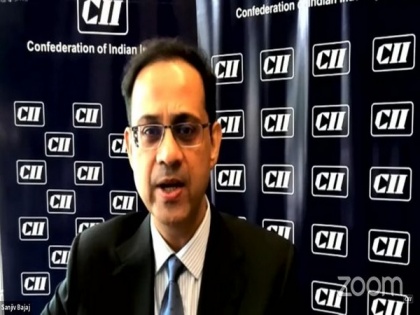Fresh look needed at capital gains tax to remove complexities, inconsistencies: CII President
By ANI | Published: November 20, 2022 03:23 PM2022-11-20T15:23:49+5:302022-11-20T20:55:02+5:30
A fresh look is needed at the capital gains tax with respect to its rates and holding period to ...

Fresh look needed at capital gains tax to remove complexities, inconsistencies: CII President
A fresh look is needed at the capital gains tax with respect to its rates and holding period to remove complexities and inconsistencies, CII President Sanjiv Bajaj said, adding that the government should contemplate a reduction in the rates of personal income tax in its next push for reform as this would increase disposable incomes and revive the demand cycle.
While presenting its pre-budget memorandum to the Ministry of Finance, the Confederation of Indian Industry (CII) outlined a four-point agenda to re-energise growth in the economy.
CII stressed on the need for revitalising the investment as well as consumption demand to infuse vibrancy in the economy.
For reviving investment, the memorandum recommended raising capital spending to 3.3-3.4 per cent of GDP in FY24 from 2.9 per cent currently to increase it further to a 3.8-3.9 per cent by FY25. It also suggested increasing outlays on green infrastructure like renewables along with traditional infrastructure like roads, railways, and ports, etc.
The memorandum said in addition, full implementation of Gati Shakti and National Infrastructure Pipeline (NIP) should be expedited to bring in efficiency in infrastructure creation.
For financing infrastructure, CII has recommended deepening of corporate bond markets (including infrastructure bonds), prioritising a package for large play of urban municipal bonds, launching of a Blended Finance Star Multiplier programme for sustainability projects with an allocation Rs 10,000 crore, among others.
Private sector investment also needs a boost as public investment alone is not enough to energise growth in the economy.
Private sector participation in public-private partnerships (PPPs) should also be revived through timely payments, Swift Dispute Resolution Mechanism and expediting the land acquisition process, it said.
For raising consumption demand, CII has suggested putting in place policies such as rationalising income tax slabs and rates for individuals, reducing 28 per cent goods and services tax (GST) rate on select consumer durables, expediting rural infrastructure projects for facilitating employment generation in the hinterland.
On fiscal consolidation, the second key component critical for revival of growth, CII suggested that a credible roadmap be drawn up and announced during the Budget which would gradually bring down fiscal deficit to 6.0 per cent of GDP in FY24 and to 4.5 per cent by FY26.
On revenue generation, CII stressed on meeting the disinvestment target, and to bring pace to PSU privatisation, which would augment revenues in addition to boosting economic efficiency, the responsibility and authority for identified PSUs should be transferred to Department of Investment and Public Asset Management (DIPAM) from the line ministries post the decision to privatise a company.
On measures related to expenditure rationalisation, CII emphasised on the need to curtail non-priority expenditure by rationalising subsides such as fuel and fertilisers.
It is estimated that non-merit subsidies comprise a staggering 5.7 per cent of GDP, of which 1.6 per cent is from the Centre and 4.1 per cent from the states. This is clearly unsustainable.
On encouraging manufacturing and boosting exports, the third and fourth key ingredient pivotal for reviving growth, CII suggested a fillip to ease of doing business through further digitisation, faster and time-bound clearance, contract enforcement, alternate dispute redressal mechanism and a genuine single-window system encompassing central and state clearances.
Tax certainty for businesses should continue and corporate tax rates should be maintained at the current levels. CII has also suggested that no arrests or detention should take place in civil cases unless criminalisation in business has been proved beyond doubt.
"With shifting global value chains, this is an opportune time for India to expand its manufacturing. While the Government has done much on Ease of Dong Business, more can be done. The Budget could announce a cross-ministry Compliance Commission which could look at rationalization, digitisation and decriminalisation of India's regulations', stated Chandrajit Banerjee, Director General, CII.
CII also suggested that the Credit-Linked Capital Subsidy Scheme (CLCSS) for technology up-gradation for micro small, medium enterprises (MSMEs), should be revived and green finance should be provided for funding climate-friendly technology in MSMEs, according to CII.
Further, to provide a fillip to exports, CII has recommended a graded roadmap to shift import duty slabs to a competitive level and covering all the export products, including the Export Oriented Unit (EOU) and SEZ units, under the Remission of Duties and Taxes on Export Products (RoDTEP) scheme.
The sunset date for commencing manufacture under Section 115BAB of the income tax Act should be extended from current March 31, 2024, till 31 March 2025. This would encourage more investment in the manufacturing sector and exports, according to CII.
( With inputs from ANI )
Disclaimer: This post has been auto-published from an agency feed without any modifications to the text and has not been reviewed by an editor
Open in app